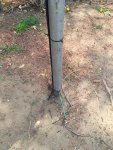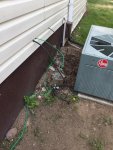Here are a couple of suggestions to improve your ground system.
The thing is, though, grounding is not going to help with static in the summer months that is caused by storms from hundreds or even thousands of miles away. It won't even help with corona discharge when local conditions are bad. The RF ground for the antenna and the grounding for the station are two different things too.
I have my tower loaded up as a vertical mast radiator and use it for long distance on 75/80 and 160 meters. And I use the 160 dipole for NVIS out to 500 miles or so. Neither one is any good for listening in the summer when there's static. Most of the local noise is vertically polarized, so the vertical as a listening antenna is horrible. Most everybody I know that uses verticals on HF, myself included, use them only for transmitting and switch to a DC grounded antenna like a loop for listening.
I had a vertical plane 80m delta loop for awhile with the top at 88 feet, vertically polarized. It was no better than the tower for listening, and didn't have near the gain or low radiation takeoff of the tower for transmitting. I switched it to horizontal polarization for listening and it was noisier than my little 6m quad loop for Rx on HF and didn't provide any better signal/noise ratio. So I finally took it down and put the 160 dipole back up, since it is a lot more useful antenna.
The message is that a fairly small loop antenna makes a pretty good Rx antenna for HF if you can get it high enough. My 6m loop is at 97 feet and it remains the best HF Rx antenna I have tried to-date. It can easily pick up all the (remaining) clear channel AM radio stations in the US during the day**.
Edit:
** I should have said "most" and not "all". There's some like WOAI in Texas and KBBI in Homer, AK that don't come in until night time. But WA0RCR in Missouri with the Gateway 160 broadcast on weekends is a good test for an HF listening antenna since I think Vern transmits at around 300-400 watts on a Rohn 25G loaded up as a vertical. My 160 dipole can pick up Vern's broadcast at night, but it is very rough copy except in the winter time. Using the tower for listening to WA0RCR, I get a better signal but more noise, so the copy is no better. Using that little 6m quad loop, WA0RCR is armchair copy and I can sometimes even pick him up on the loop in early afternoon on Saturday before the propagation gets better at night.
Just wanted to provide that little comparison to illustrate what a loop can do as a listening antenna. I'm not totally "sold" on loops for transmitting. But they sure work nice on Rx for SWL. And in my experience, the higher you can get it, the better it works as a receiving antenna.



